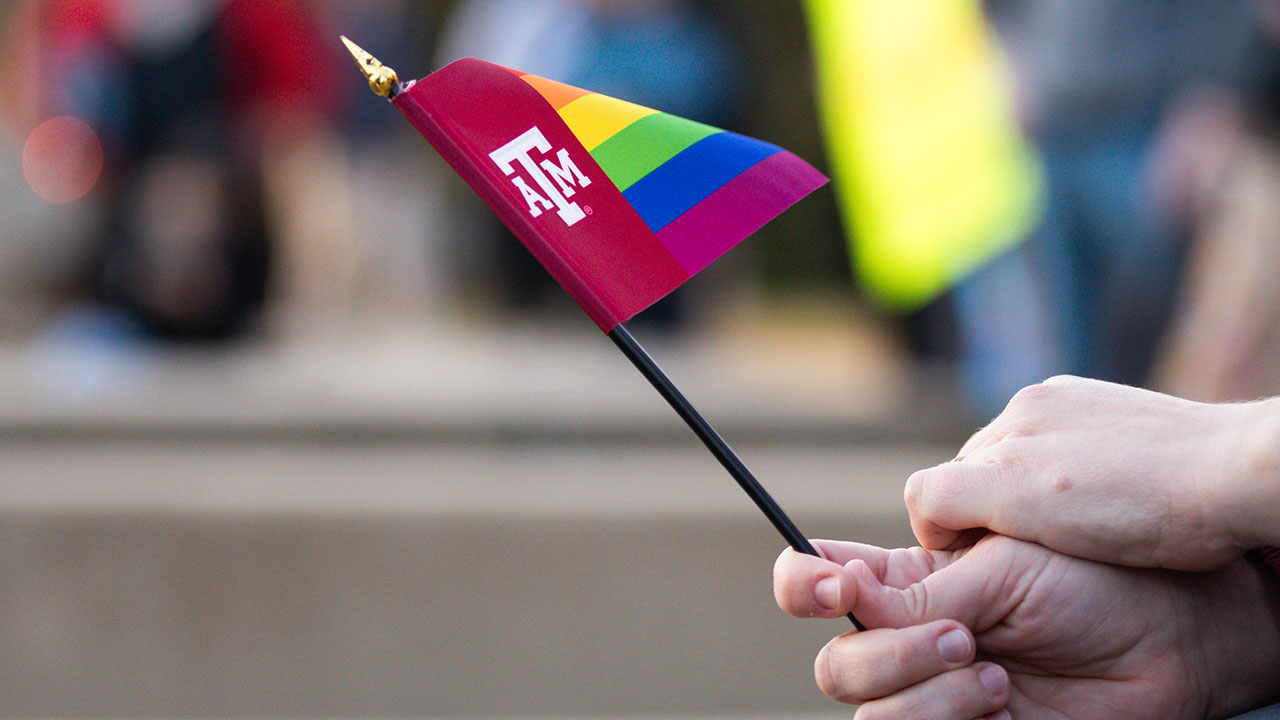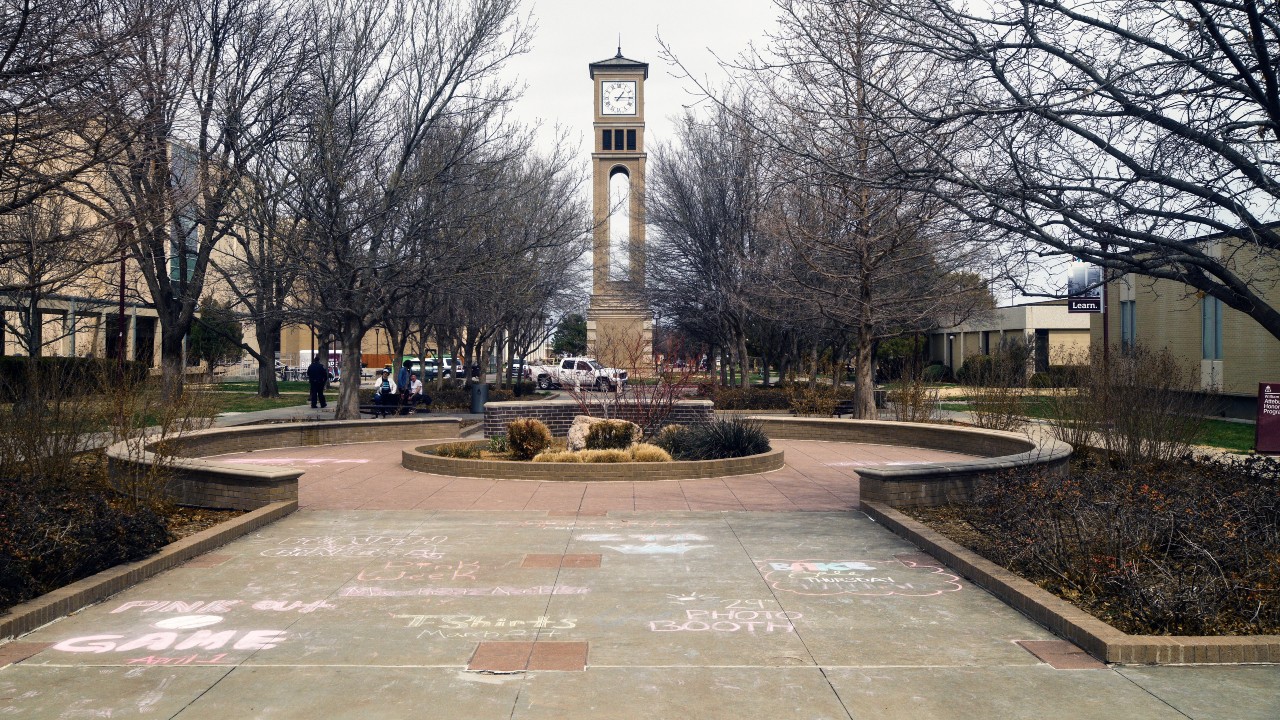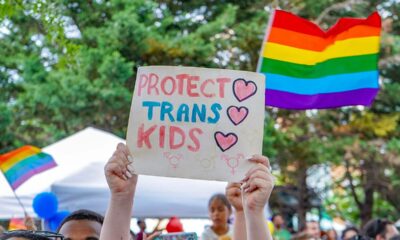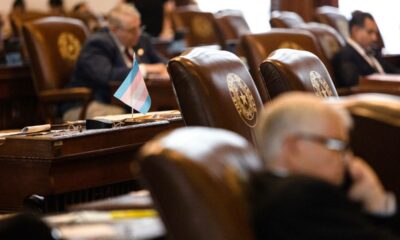Texas
As Texas targets trans kids, their families scramble to find lawyers
Ever since Gov. Greg Abbott directed the state’s child welfare agency to investigate parents who provide gender-affirming care to their children, LGBTQ-affirming family lawyers statewide have been deluged with calls.

This article originally appeared in The Texas Tribune
 For the last two weeks, a mom in the Austin area has been vacillating between rage and panic. Some days, she’s so fired up she feels like she could take on the entire state of Texas by herself. Other days, she just crawls under her weighted blanket and lets the fear take over.
For the last two weeks, a mom in the Austin area has been vacillating between rage and panic. Some days, she’s so fired up she feels like she could take on the entire state of Texas by herself. Other days, she just crawls under her weighted blanket and lets the fear take over.
The woman, who asked not to be identified to protect her family, has an 8-year-old transgender daughter. In late February, Gov. Greg Abbott directed the state’s child welfare agency to open child abuse investigations into parents that provide gender-affirming care to their children.
This family hasn’t had a visit from Child Protective Services, but they know others who have and they’ve started preparing for the possibility that they could be next.
They’re trying to figure out how to explain all this to their daughter, who they’ve tried their best to keep insulated from the growing anti-trans backlash.
“Sadly, that’s going to change,” she said. “We’re going to have to have a conversation with her about somebody potentially coming to her school and trying to talk to her.”
Even though they have no reason to believe that they’re going to be investigated, the family has started speaking with a lawyer who specializes in LGBTQ family law.
“It would put my mind at ease to know that I have a human being I can call, a sort of a helpline if somebody shows up at my door, somebody that already knows my family,” she said.
This mom isn’t alone. The Texas Tribune talked to seven families with transgender children who have proactively hired lawyers as a result of this directive. None were willing to give their names, fearing that someone might report them if their identity became known.
And lawyers who specialize in LGBTQ family law say the number of families reaching out in fear of potential child abuse investigations is unlike anything they’ve ever seen.
Last week, Ian Pittman’s phone started ringing. And it hasn’t stopped since. Pittman is based in Austin and, as a family lawyer specializing in LGBTQ issues, works in a growing and underserved sector.
“But I have never gotten this many phone calls or requests for consultations,” he said. “The number of people who have called has exponentially increased … and the common thread is that everybody feels terrorized.”
This latest wave of fear among parents of trans kids started two weeks ago, when Texas Attorney General Ken Paxton issued a legally nonbinding opinion equating certain gender-affirming medical treatments for transgender children with child abuse. Abbott followed up with a letter directing the state’s child welfare agency to open investigations into “any reported instances of these abusive procedures.”
Most gender-affirming care focuses on “social transition” — allowing a child to express their gender however they see fit. Some transgender children take puberty blockers, a completely reversible medical treatment that’s prescribed for a wide range of situations beyond transition. Paxton and Abbott also cited concerns over gender-affirming surgeries that are rarely, if ever, used on children.
In a court hearing Wednesday, a lawyer for the state argued that the directive is not intended to mean that the use of puberty blockers or gender-affirming surgery is always abuse, rather that it could be used in an abusive manner.
But anyone can make a report of child abuse, anonymously, and the state has to investigate, meaning parents could face an investigation for any number of reasons.
Pittman is representing two clients who are currently facing investigation by Child Protective Services. Though the reports are anonymous, he said he has reason to believe at least one of the allegations was politically motivated.
The family’s address on the report was one they haven’t lived at for years, ever since it was released publicly as part of a doxxing campaign against trans activists.
Pittman and other lawyers say they’ve also been deluged with calls from families who haven’t yet been contacted by CPS but want to be prepared. He said one family was preparing to start their child on puberty blockers and wanted his opinion on whether they should wait.
“I’ve never before had to consult parents of children about whether or not they should follow doctor’s orders,” the attorney said. “The fact that they think that they need to get a legal opinion about whether to follow medical advice is mind-boggling.”
Many lawyers and advocates are hopeful that this directive will be struck down by the courts. A state judge on Wednesday intervened to stop an ongoing investigation into the parents of a 16-year-old transgender teenager and scheduled a hearing for next week to consider a statewide injunction.
Paxton filed an appeal Thursday, so rather than having that hearing next week as planned, there is a temporary hold on the injunction hearing until the higher court rules.
And while that all gets sorted out, there are at least two other ongoing investigations — and the real number may be much higher. A spokesperson for the Texas Department of Family and Protective Services did not respond to a request for comment on the number of reports the agency has received and the number of ongoing investigations.
DebnamRust, a Dallas law firm that specializes in LGBTQ family law, is currently working with five families, some of whom are currently under investigation by CPS. Attorney Derek Mergele-Rust said these families are not willing to just wait for the courts to sort this out while their lives hang in the balance.
“There is a palpable fear from parents who are afraid their kids are going to be taken away from them and they’re going to be labeled as child abusers,” said Mergele-Rust. “If you’re labeled as a child abuser and you are a licensed professional in the state of Texas, you can’t do your job anymore … there are far-reaching consequences on parents’ lives, too.”
Mergele-Rust and other lawyers interviewed for this story stressed the importance of starting to build a relationship with an experienced family law attorney now, even if CPS hasn’t gotten involved yet.
“You need a plan,” he said. “A lot of parents are being encouraged to gather documents from doctors and the schools stating that the children are fine and they’re following doctor’s care, things of that nature.”
Families may also need more than one LGBTQ-affirming family lawyer on speed dial. As is typical in child abuse cases, the children need a different lawyer than the parents; ideally, in these cases, they want those lawyers in person during the interviews.
There is some light on the horizon for these families: In just the past week, Lambda Legal and the National Center for Lesbian Rights have heard from hundreds of child welfare lawyers statewide who are stepping up to provide pro bono or low-cost representation to these families.
NCLR legal director Shannon Minter, a trans man who lives in East Texas, said that support has been inspiring to see — and horrifying that it’s necessary.
“This is the worst thing I’ve ever seen happen … to LGBTQ people in my 30 years of practicing in this area of law,” Minter said. “It’s such a blatant fiction to try to say that supporting a transgender kid is abuse.”
Minter encouraged families to call Lambda Legal or the NCLR to get in touch with a lawyer sooner rather than later.
“Once you’re in the clutch of the child welfare system, you’re very vulnerable,” he said. “You don’t want to have to, at that point, be wasting time and energy looking for a lawyer after you’re already targeted.”
Reporter Sneha Dey contributed to this story.
The Texas Tribune is a nonpartisan, nonprofit media organization that informs Texans — and engages with them – about public policy, politics, government and statewide issues.
Education
Texas colleges launch course reviews amid push to limit gender identity instruction
After a viral video stirred controversy at Texas A&M, Texas Tech ordered course adjustments while other university systems like UNT and UT launched reviews. It’s unclear what the reviews will look for.

This article originally appeared in The Texas Tribune
 Last month, a viral video showing a Texas A&M University student confronting a professor over a discussion of gender identity during a children’s literature class sparked a firestorm in Texas higher education that has led other schools to review their academic offerings.
Last month, a viral video showing a Texas A&M University student confronting a professor over a discussion of gender identity during a children’s literature class sparked a firestorm in Texas higher education that has led other schools to review their academic offerings.
Texas A&M fired the professor in the video and former university President Mark A. Welsh III resigned. Seeking to preempt any similar controversy, the Texas Tech University System issued guidance last week instructing faculty to ensure that their courses comply with a federal executive order, a letter from Gov. Greg Abbott and a new state law that recognizes only two sexes.
Faculty and LGBTQ+ advocates fear the directive will limit classroom discussion of transgender and nonbinary identities. They warn the universities’ actions are the byproduct of political interference that threatens academic freedom and the quality of higher education in the state.
Brian Evans, president of the Texas Conference of the American Association of University Professors, said administrators should enable students to learn the widest set of topics by ensuring faculty can speak freely. He added that colleges and universities “have an obligation to develop campus policies that protect the Constitutional rights of their faculty to teach and research the subjects in their areas of expertise without intimidation or censorship.”
No law explicitly bars teaching topics like gender identity or the existence of more than two sexes. But Texas universities know their courses are under the microscope, with politicians and activists combing through catalogs and syllabi and demanding changes to any material they consider objectionable.
In the heels of Texas Tech’s guidance, at least three public university systems — the University of North Texas, the University of Texas and Texas Woman’s University — have ordered course reviews. They have framed the effort as ensuring compliance with state and federal law. But UT, UNT and TWU, unlike Texas Tech, did not specify which laws triggered the reviews. The systems did not say what actions their schools would take after the reviews.
Public universities are required to conduct curriculum reviews under Senate Bill 37, passed this year, but the first reviews aren’t due until 2027. The law directs governing boards to examine whether general education courses “are necessary to prepare students for civic and professional life” and “ensure a breadth of knowledge.” Earlier versions of the bill went much further, barring courses from promoting the superiority of any race, sex or religion, or from endorsing specific public policies or ideologies, but that language was cut before passage.
Here’s what public university systems and community colleges in the state have said so far:
Texas A&M University System
Chancellor Glenn Hegar announced on Sept. 9 a systemwide audit of course offerings, a day after Rep. Brian Harrison, R-Midlothian, posted a secretly recorded video of the children’s literature class.
The clip went viral, and within days, professor Melissa McCoul was fired, the dean of the College of Arts and Sciences and the head of the English Department were removed, and Welsh resigned under pressure from state leaders who said he had mishandled the controversy.
Hegar has not publicly detailed how the course review will be carried out or what criteria will be used.
Texas Tech University System
Chancellor Tedd Mitchell directed the presidents of the system’s five universities to review course materials, syllabi and curricula.
In a Sept. 25 letter, Mitchell told the university presidents to “make timely adjustments where needed” to comply with President Donald Trump’s Jan. 20 executive order, Gov. Greg Abbott’s Jan. 30 letter and House Bill 229, all of which recognize only two sexes, male and female. None of them directly requires or mentions restrictions on teaching.
“While recognizing the First Amendment rights of employees in their personal capacity, faculty must comply with these laws in the instruction of students, within the course and scope of their employment,” Mitchell wrote.
The order offered no details on how the reviews would be conducted, leaving faculty uncertain about what changes might follow and drawing criticism from free speech and LGBTQ+ advocates who called it censorship and accused it of being cruel to trans and nonbinary students.
Mitchell’s directive came after Angelo State University, part of the Texas Tech System, told faculty they could not discuss transgender and nonbinary identities in their classes, making it the first known public Texas university to restrict classroom acknowledgment of such gender identities.
University of North Texas System
On Sept. 29, Chancellor Michael Williams directed each UNT System institution to conduct an expedited review of its academic courses and programs, including a complete syllabi review, to ensure compliance with “all current applicable state and federal laws, executive orders, and court orders.” Campuses have until Jan. 1 to finish the reviews.
Although Williams’ letter did not mention Trump’s executive order, Abbott’s letter or House Bill 229 like Mitchell’s directive did, a UNT system spokesperson told The Texas Tribune they will be considered in the course reviews. But when asked whether the system believes those measures prohibit schools from teaching that there are more than two sexes, or what the reviews will specifically look for, the spokesperson said only that those questions “will be discussed in the reviews.”
University of Texas System
A UT System spokesperson told the Tribune that the system is reviewing “gender identity” courses across all campuses “to ensure compliance and alignment with applicable law and state and federal guidance, and to make sure any courses that are taught on UT campuses are aligned with the direction and priorities of the Board of Regents.” The review will be discussed at the regents’ November meeting, the spokesperson said.
The UT System did not cite any specific measures that had triggered the reviews. The spokesperson did not say whether the system was interpreting and applying the president’s executive order, the governor’s letter or House Bill 229 in the same way as Texas Tech did.
The UT System also did not clarify what “reviewing gender identity courses” means in practice or whether it intends to prohibit or alter such classes.
University of Houston System
The system did not respond Tuesday to the Tribune’s request for comment.
Texas State University System
The system did not respond Tuesday to the Tribune’s request for comment.
Texas Woman’s University System
Texas Woman’s University System is “in the process of establishing a review of academic courses and programs, in accordance with all applicable state and federal laws,”a spokesperson said. The system, which is the state’s newest and smallest with campuses in Denton, Dallas and Houston, did not specify what the review will look for or whether it could result in changes to courses or programs.
Community colleges
In the Houston area, San Jacinto College “has made faculty and staff aware” of Trump’s executive order, Gov. Abbott’s letter and House Bill 229, according to Amanda Fenwick, a spokesperson for the college. Faculty have been instructed to do a review of course content, she said.
“San Jacinto College is committed to understanding and following federal and state laws and ensuring that all employees — including faculty — are compliant,” Fenwick wrote in a statement to the Tribune.
As part of the review, faculty have been ordered to ensure course content is aligned with student growth goals, which are in the Texas Higher Education Coordinating Board’s Academic Course Guide Manual and Workforce Education Course Manual, Fenwick said.
Texas has 50 community colleges. It is unclear if any other school is planning to review their courses. The Tribune also reached out to Alvin Community College and Blinn College, but they have not responded.
Sneha Dey contributed to this story.
The Texas Tribune partners with Open Campus on higher education coverage.
Disclosure: Texas Tech University System and University of North Texas have been financial supporters of The Texas Tribune, a nonprofit, nonpartisan news organization that is funded in part by donations from members, foundations and corporate sponsors. Financial supporters play no role in the Tribune’s journalism. Find a complete list of them here.
The Texas Tribune is a nonpartisan, nonprofit media organization that informs Texans — and engages with them – about public policy, politics, government and statewide issues.
Education
Feds investigate another Texas school district for its gender identity mandate
Katy ISD’s board voted this past fall to require staff to notify parents if their child wants to use a different pronoun or identifies as a different gender.

This article originally appeared in The Texas Tribune
 The U.S. Department of Education’s Office for Civil Rights opened an investigation Monday into Katy Independent School District’s gender identity policy on the basis of gender harassment under Title IX. The investigation came nine months after the Houston Landing reported that the district adopted a policy that notifies parents if their child requests to use a different name or pronouns at school.
The U.S. Department of Education’s Office for Civil Rights opened an investigation Monday into Katy Independent School District’s gender identity policy on the basis of gender harassment under Title IX. The investigation came nine months after the Houston Landing reported that the district adopted a policy that notifies parents if their child requests to use a different name or pronouns at school.
Katy ISD did not respond to a request of how many parents have been notified this year under the new policy, which requires staff to inform parents that students are transgender or ask to use different names or pronouns.
The Houston Chronicle reported in December that the district had notified parents at least 23 times since the policy was adopted.
The gender identity policy also bars schools from teaching “gender fluidity” and denies students from competing in sports with the gender they identify with, which mirrors state legislation already regulating K-12 athletics.
Students Engaged in Advancing Texas, a student-led advocacy group, filed a complaint with the U.S. Department of Education in November regarding the policy. Katy ISD graduate and member of SEAT Cameron Samuels labels the investigation as a win against the conservative policies being passed in the district.
“Elected solely on platforms to target marginalized students, far-right school board candidates accomplished exactly what they were elected to do: weaponize identity and neglect students’ educational needs,” they said.
Title IX prohibits sex-based discrimination in educational settings or federally funded activities. Gov. Greg Abbott has loudly voiced his opposition to the federal law recently ordering the Texas Education Agency to disregard the Biden administration’s expansion of Title IX.
“The district is committed to offering equal educational opportunities to our entire community,” a spokesperson from Katy ISD told the Tribune in a response to the investigation. “While we have received the OCR filing and deny any wrongdoing, we are committed to remaining fully cooperative and responsive throughout the process.”
Victor Perez, Katy ISD board president and proponent of the policy, argued that the policy was “mischaracterized” by community members as an attack on its queer and transgender students and instead relieves the burden for staff withholding information from parents. The policy was passed at a board meeting in August with a vote of 4-3 after four hours of public comment.
Alastair Parker, a member of the Cinco Ranch High School Gender-Sexuality Alliance, spoke at the board meeting in opposition to the policy.
Parker and others argued that the policy infringes on the rights of transgender kids to express themselves and opens them to potential harm if they are outed to transphobic parents or caregivers.
Johnathan Gooch from Equality Texas, a nonprofit advocacy group for LGBTQ+ Texans, said he hopes students recognize their power to report policies like this in the wake of the increasing number of legislation targeting LGBTQ+ youth.
This isn’t the first instance in Texas of a gender related policy being investigated on the federal level. Carroll ISD in Tarrant County was reported to have eight open investigations last February after it eliminated protections over race, religion, gender and sexual orientation.
There are documented mental health benefits to using preferred pronouns. A research team at the University Texas at Austin conducted a study in which they concluded that students in gender-affirming environments report 71% fewer symptoms of severe depression, a 34% decrease in reported suicidal ideation and a 65% decrease in suicide attempts.
“When students place their trust in teachers and school administration, the school has a duty to preserve that trust,” Gooch said. “That duty requires schools to ensure that no disclosure would place a student in harm’s way.”
Parker has been out as a transgender man since the seventh grade and is supported by his father, who he resides with. He acknowledged that this isn’t the case for many of his classmates as some have parents that are less accepting.
His teachers have gone by his preferred name and pronouns for his entire high school experience. But since the policy has been enacted, he has seen some of his peers go by their deadnames fearing that their parents would be notified.
Over the past year, other schools across the state have adopted similar policies.
Keller ISD, which is also in Tarrant County, passed a policy in late June that prevents students from using their preferred name and pronouns or using restrooms with the gender they identify with.
The policy was met with retaliation from the Texas American Civil Liberties Union, writing in a letter to the district that the policy is “deeply invasive and unlawful for school administrators to interrogate students’ private medical information in this way.”
As the end of the school year nears, Parker observed the policy being enforced at varying levels of severity by teachers. The passing of legislation or policy like this deters from the ongoing health crisis for queer and transgender youth and is wholly unnecessary, he said.
“If a child’s not telling their parents something like that, it’s for a reason,” he said. “I know that most of the people who are in favor of this are the ones who bounce off whatever their parents have told them to repeat.”
Disclosure: Equality Texas has been a financial supporter of The Texas Tribune, a nonprofit, nonpartisan news organization that is funded in part by donations from members, foundations and corporate sponsors. Financial supporters play no role in the Tribune’s journalism. Find a complete list of them here.
The Texas Tribune is a nonpartisan, nonprofit media organization that informs Texans — and engages with them – about public policy, politics, government and statewide issues.
Amarillo
Appeals court considers whether West Texas A&M drag show was unconstitutionally banned
University President Walter Wendler canceled a drag performance last year, claiming such shows “denigrate and demean women.”

This article originally appeared in The Texas Tribune
 A federal appeals court considering whether West Texas A&M University’s president violated the First Amendment when he canceled a campus drag show last year focused many of their questions Monday on a U.S. Supreme Court ruling that upheld campus non-discrimination policies.
A federal appeals court considering whether West Texas A&M University’s president violated the First Amendment when he canceled a campus drag show last year focused many of their questions Monday on a U.S. Supreme Court ruling that upheld campus non-discrimination policies.
But the panel of three judges used that 2010 case — which said universities can require groups to admit LGBTQ+ students — to suggest that school officials could also ban drag shows because some people find the performances offensive to women.
A lawyer representing a group of West Texas A&M students who’ve twice attempted to host a drag show on campus argued before the 5th U.S. Circuit Court of Appeals Monday that President Walter Wendler discriminated based on viewpoint and censored speech when canceling the performances.
In March 2023, Wendler banned drag shows in response to a student fundraiser that featured drag performers. The president argued the performances “denigrate and demean women,” and shouldn’t be allowed on the public university’s campus.
In September, a federal judge said Wendler acted within his authority to cancel the drag show. In his opinion, U.S. District Judge Matthew Kacsmaryk wrote, at “this point in Free Speech jurisprudence, it is not clearly established that all ‘drag shows’ are categorically ‘expressive conduct.’”
Last month, students with WT Spectrum, the student group at the university, hoped to hold another drag show on campus — to show support for the LGBTQ+ community in a staunchly conservative corner of Texas.
With Wendler’s campus-wide ban still in place, the Supreme Court declined to intervene and the president again ordered the fundraiser from taking place.
The panel of judges hearing the appeal Monday were James Dennis, James Ho and Leslie Southwick.
Many of their questions centered around Christian Legal Society v. Martinez, a case in which the Supreme Court upheld a policy of the University of California, Hastings College of the Law, that bars student groups from excluding members based on status or beliefs.
In 2010, the Supreme Court affirmed that Hastings’ policy does not violate the First Amendment rights of CLS, a group of students that wanted to be officially recognized on campus while not allowing people who engage in “unrepentant homosexual conduct” from joining.
The 5th Circuit judges Monday seemed to suggest that Wendler’s ban was no different from the policy at the center of the 2010 Supreme Court case. One of the judges, who didn’t identify themselves before speaking, asked if plaintiffs intended to use the case in question to overturn CLS.
“Maybe we should overturn CLS?” one of three judges said. “Many people would like CLS overturned.”
Ho equated the policy upheld in CLS with Wendler’s drag ban. He said both intend to make everyone feel included, but the policies have the consequence of targeting one group. In CLS’ case, he said that Christians were singled out on Hastings’ campus for not allowing LGBTQ+ individuals to join. Ho said that previous groups on Hastings’ campus could exclude members, but CLS was singled out by the university’s non-discrimination policy.
JT Morris, senior attorney for the Foundation for Individual Rights and Expression who represented the students, argued that the judges were comparing “apples to oranges” between the two cases.
Morris argued CLS is about a content-neutral policy, while Wendler was clearly discriminating based on viewpoint.
“The First Amendment does not allow the government to use the subjective term ‘offensive’ to restrict speech,” Morris said.
Joseph N. Mazzara, a lawyer with the Texas Attorney General’s Office who represented Wendler, said the students had not suffered any injury as a result of the no-drag policy because there was no future event featuring drag performers planned. Additionally, Mazzara said Wendler’s policy carried no criminal penalties and students could host drag performances off campus.
Mazzara said Wendler’s ban was not a free speech violation, but rather it was akin to banning certain conduct, like skateboarding on the grounds of a monument. He said drag shows constituted conduct, not speech.
“They’re able to do everything they want to do, they’re able to say all the speech they want to [say],” Mazzara said, referring to the student group WT Spectrum. “They just can’t do this one particular thing in this one particular place.”
A judge asked Mazzara how the university would have treated drag shows put on by other student groups, such as a fraternity. The judges seemed to agree with Mazzara that Wendler’s restriction did not target a specific viewpoint.
“If a Christian legal group wanted to have a ‘Drag for Jesus’ event that would also be banned,” Mazzara said.
One judge suggested that some drag shows are offensive to the transgender community, and thus Wendler’s ban would equally protect that population from offensive performances.
Allison Marie Collins, another lawyer from the Attorney General’s Office representing other defendants named in the lawsuit, argued the appellate judges should not impose any restrictions on Texas A&M system Chancellor John Sharp or West Texas A&M Vice President for Student Affairs Christopher Thomas. She argued an injunction against Sharp or Thomas would be overbroad, because it’s clear that only Wendler has acted to stop these shows.
“Neither Chancellor Sharp nor Dr. Thomas have remotely engaged in viewpoint discrimination, exclusion from a public forum or a prior restraint complaint to speech,” Collins said.
In his rebuttal, Morris argued the plaintiffs have standing over Sharp because he has the authority over Wendler to put an end to this restriction on free speech.
“He has the authority to do what’s best for the campus,” Morris said of Sharp. “He should have put an end to this prior restraint, which shouldn’t have lasted a day, and has now lasted a year.”
Disclosure: Texas A&M University and West Texas A&M University have been financial supporters of The Texas Tribune, a nonprofit, nonpartisan news organization that is funded in part by donations from members, foundations and corporate sponsors. Financial supporters play no role in the Tribune’s journalism. Find a complete list of them here.
The Texas Tribune is a nonpartisan, nonprofit media organization that informs Texans — and engages with them – about public policy, politics, government and statewide issues.














